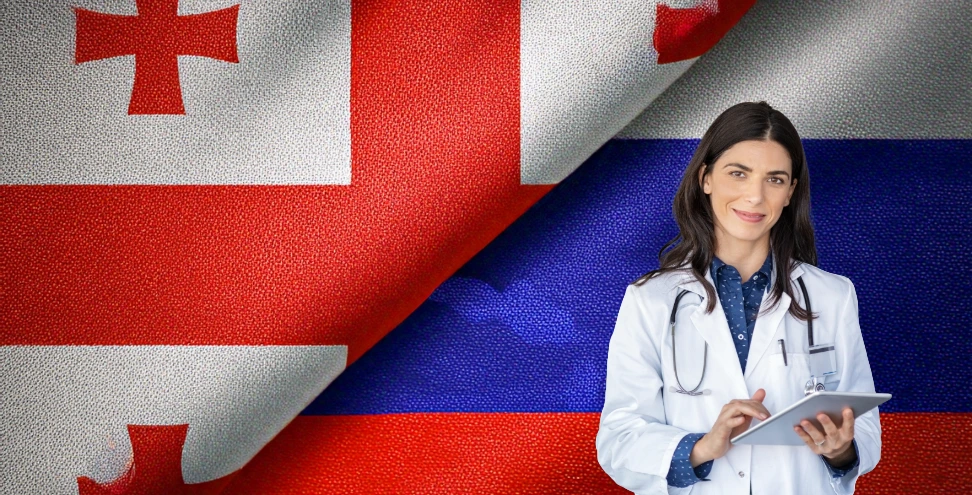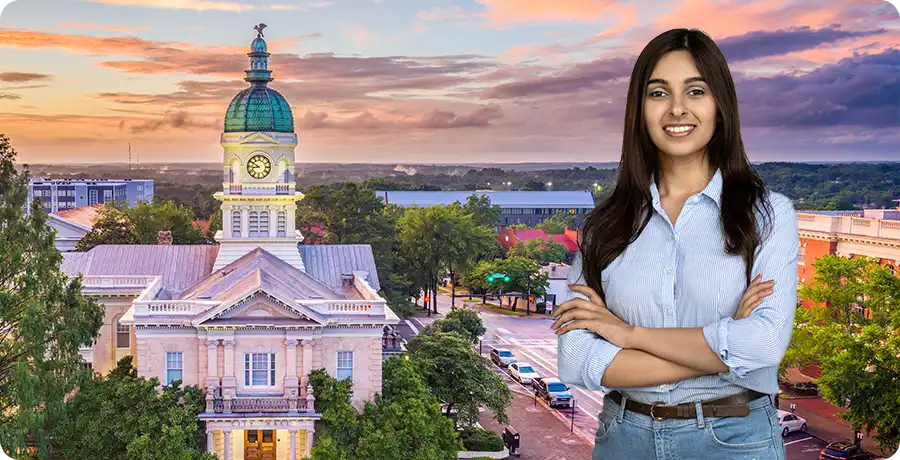Georgia has become a popular destination for foreign students, particularly from India, Bangladesh, Nigeria, and the Middle East. Being geographically situated between Europe and Asia, Georgia provides globally accepted degrees, low tuition fees, and English-language programs in business, medicine, and engineering.
Its universities, such as Tbilisi State Medical University and the Georgian National University SEU, are becoming increasingly popular due to their high academic standards and low living expenses. Additionally, the visa process is not very complicated, and in the majority of cases, students do not need to provide IELTS.
For students seeking a high-quality education at a lower cost in a safe and culturally rich environment, studying in Georgia is a smart and popular option.
Visa Types for Students in Georgia
Students seeking to study in Georgia must apply for a Category D3 Student Visa to enter the country legally for educational purposes. Once in Georgia, they will be required to apply for a residence permit to stay beyond 90 days.
| Visa Type | Purpose | Duration |
| D3 Visa | For international students studying in a recognized institution | 90 days (single-entry) |
| Residence Permit | Necessary for extended stay during studies | 1 year (renewable) |
Some visa-exempt students are allowed to enter Georgia without a visa and directly apply for the residence permit upon arrival.
Who Requires a Georgia Student Visa? (Visa-Exempt vs Non-Exempt Countries)
Georgia has bilateral treaties that permit nationals of certain countries to come visa-free for a maximum period of 365 days, such as the United Arab Emirates, most EU nations, as well as the United States.
Students Who Need a D3 Visa
You need to apply for a student visa if you are from:
- India
- Pakistan
- Nigeria
- Bangladesh
- Egypt
Students Who Can Enter Visa-Free
You don't require a visa to enter Georgia if you are from:
- United Arab Emirates
- European Union countries
- United States
- Saudi Arabia
- South Korea
Note: Students entering visa-free will still need to apply for a residence permit within 45 days of arrival in order to study long-term in Georgia.
Georgia Student Visa (D3) Requirements – Document Checklist
The success of a visa application relies on the submission of the right documents. The following is the necessary checklist needed for a Georgia student visa (D3) application:
| Document | Details |
| Valid Passport | Must be valid for at least 6 months after your stay |
| Admission Letter | Under the university's letter; comes with the rector's decree or confirmation |
| Visa Application Form | Filled online through Georgia's official visa portal |
| Passport-Sized Photographs | Two recent colour photographs (35x45 mm) |
| Bank Statement | Minimum 3,800 GEL or equivalent for proof of funds |
| Health Insurance | Should cover the whole period of stay |
| Medical Certificate | Evidence of non-infected state of health |
| Translated and Notarized Documents | All documents should be translated into Georgian or English |
| Proof of Payment of Visa Fee | Approx. USD 20–25, according to embassy requirements |
All documents in languages other than Georgian or English should be translated and legalized through apostille or notarization.
Step-by-Step Guide to Applying for Georgia Student Visa (D3)
1. Obtain Admission
Submit an application and obtain an official admission letter from a Georgian university. Include a rector's decree confirming enrolment.
2. Document Preparation
Translate, apostille, and notarize all documents. Get a valid bank statement, medical certificate, and health insurance ready.
3. Online Application
Go to https://www.geoconsul.gov.ge and fill out the online visa application form. Upload all documents.
4. Appointment (if necessary)
Depending on where you're from, you might need to take an appointment at a Georgian embassy or VFS Global office.
5. Pay the Visa Fee
Visa fees are usually between USD 20–25. Payment channels differ by embassy, so refer to their website for precise information.
6. Visa Processing
Visa application usually takes 10 to 30 working days. Apply early before your course begins to avoid delays.
Processing Time and Validity Period
Processing Time
- Standard: 10–30 working days from date submitted
- Expedited (exceptional cases only): Smaller processing timelines with extra charges
Visa Validity
- The D3 visa has a validity period of 90 days from issue date.
- During this period, students must enter Georgia and apply for a residence permit to continue staying legally.
It is recommended to apply for a student visa at least 45–60 days before your intended travel date.
Student Residence Permit in Georgia – Process and Guidelines
Once in Georgia, students need to apply for a residence permit, which allows them to stay for the duration of their academic program.
Required Documents for Residence Permit
- Valid passport with Georgian entry stamp
- Rector's decree or university confirmation of enrolment
- Proof of accommodation (hostel agreement or rental agreement)
- Georgian health insurance
- Bank statement indicating financial resources
- Passport-size photograph
- Notarized translations of all documents
Where to Apply
Students may apply at any Public Service Hall in major Georgian cities like Tbilisi, Batumi, or Kutaisi.
Application Timeline and Fees
| Processing Option | Period | Government Fee (in GEL) |
| Standard | 30 calendar days | 210 GEL |
| Accelerated | 20 calendar days | 260 GEL |
| Express | 10 calendar days | 410 GEL |
Validity
- The residence permit usually lasts for 1 year and is extended by 1 year on each successive anniversary as long as the program continues.
- Not applying within 45 days of arrival can lead to a penalty or juridical issues.
Cost of Studying and Living in Georgia for International Students
Georgia is relatively cheap compared to other European countries to study.
Tuition Fees in Georgia
| Program Type | Annual Tuition Fee (INR) |
| MBBS / Medicine | ₹3,32,000 – ₹5,81,000 |
| Engineering / IT | ₹2,49,000 – ₹4,15,000 |
| Business / Management | ₹2,90,000 – ₹4,98,000 |
| Arts / Humanities | ₹2,07,000 – ₹3,32,000 |
Most universities allow tuition to be paid in 2–3 instalments within a year.
Living Expenses in Georgia
| Expense Category | Monthly Cost (INR) |
| Accommodation (shared) | ₹12,450 – ₹24,900 |
| Food and groceries | ₹8,300 – ₹12,450 |
| Transportation | ₹1,245 – ₹2,490 |
| Health insurance | ₹830 – ₹1,245 |
| Miscellaneous | ₹2,490 – ₹4,150 |
Total Estimated Monthly Cost: ₹24,000 to ₹45,000
Annual Living Cost: ₹2,88,000 to ₹5,40,000
Part-Time Work Opportunities for Students in Georgia
Although the Georgian student visa does not strictly provide any guarantee of the right to work, numerous students find ways to secure part-time employment unofficially.
- Students can work a maximum of 20 hours/week unofficially, even though no law governs part-time work.
- Popular part-time jobs include:
- Restaurant workers
- Customer service positions
- Tutoring or freelance work
- English fluency and basic Georgian help improve job chances.
- Income can cover basic living costs, not tuition.
Visa Extensions and Remaining in Georgia after Graduation
Extension of Student Residence Permit
- Apply 30 days before current permit expiry.
- Same documents as the original application required.
- Can be extended annually until the course is completed.
Post-Study Options
- Students can apply for a Temporary Residence Permit if employed after graduation.
- Requires a valid job contract and employer backing.
- Georgia does not offer a structured post-study work visa.
Consider consulting local immigration experts for long-term plans.
Common Mistakes to Avoid During Georgia Student Visa Application
- Incomplete or Incorrect Documents
- Lack of proper translations or incorrect file types can result in rejection.
- Late Applications
- Always apply at least 45–60 days before your travel date.
- Lack of Funds
- Bank statement should show at least 3,800 GEL or equivalent.
- Failure to Apply for Residence Permit in Time
- Apply within 45 days of arriving in Georgia.
- Invalid Health Insurance
- Ensure it is recognized in Georgia and covers medical emergencies.
Conclusion
- Quality English education at reasonable tuition
- A European-style lifestyle at reduced costs
- Uncomplicated and transparent visa process
- Being able to roam around Europe at will
Whether it’s MBBS, engineering, business, or humanities, Georgia provides an expanding academic climate with fewer barriers to entry.
A student who is well prepared is likely to fare better both academically and personally.
Frequently Asked Questions (FAQs) about Georgia Student Visa Process
1. Do I require a student visa if I'm a visa-exempt country?
If your country is under 365-day visa exemption with Georgia, you can enter visa-free. For extended studies, however, you will need to apply for residence within 45 days of entry.
2. What do I need to apply for a student visa (D3)?
You'll require a letter of acceptance, valid passport, proof of financial backing, and health insurance. Accommodation proof, medical certificate, and police clearance certificate are also needed.
3. What is the cost of the student visa and how long does it take to process?
The cost of the visa is approximately ₹1,800–₹2,100 based on the exchange rate and location. Standard processing takes 10 to 30 working days, with expedited services possible.
4. For how long is the student residence permit valid and is it possible to renew?
The residence permit is renewable annually and every academic year. It takes 30 calendar days for regular processing or quicker with extra fees.
5. Am I allowed to work part-time as a student in Georgia?
Yes, international students holding a valid residence permit are entitled to work up to 20 hours a week. Part-time jobs typically include work in hospitality, tutoring, and freelance activities.
6. What if my documents are not in English or Georgian?
All the documents should be officially translated into English or Georgian and be notarized. These may include academic transcripts, proofs of finance, and medical or legal certificates.
7. What if I fail to apply for a residence permit in good time?
Not applying within 45 days can result in fines, legal consequences, or deportation. It is advisable to go to a Public Service Hall and apply as early as possible.



.png)

.png)


